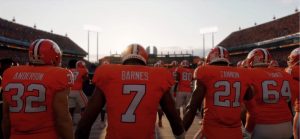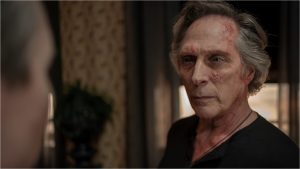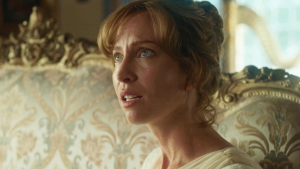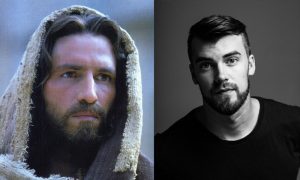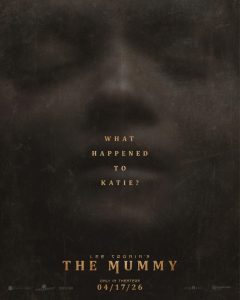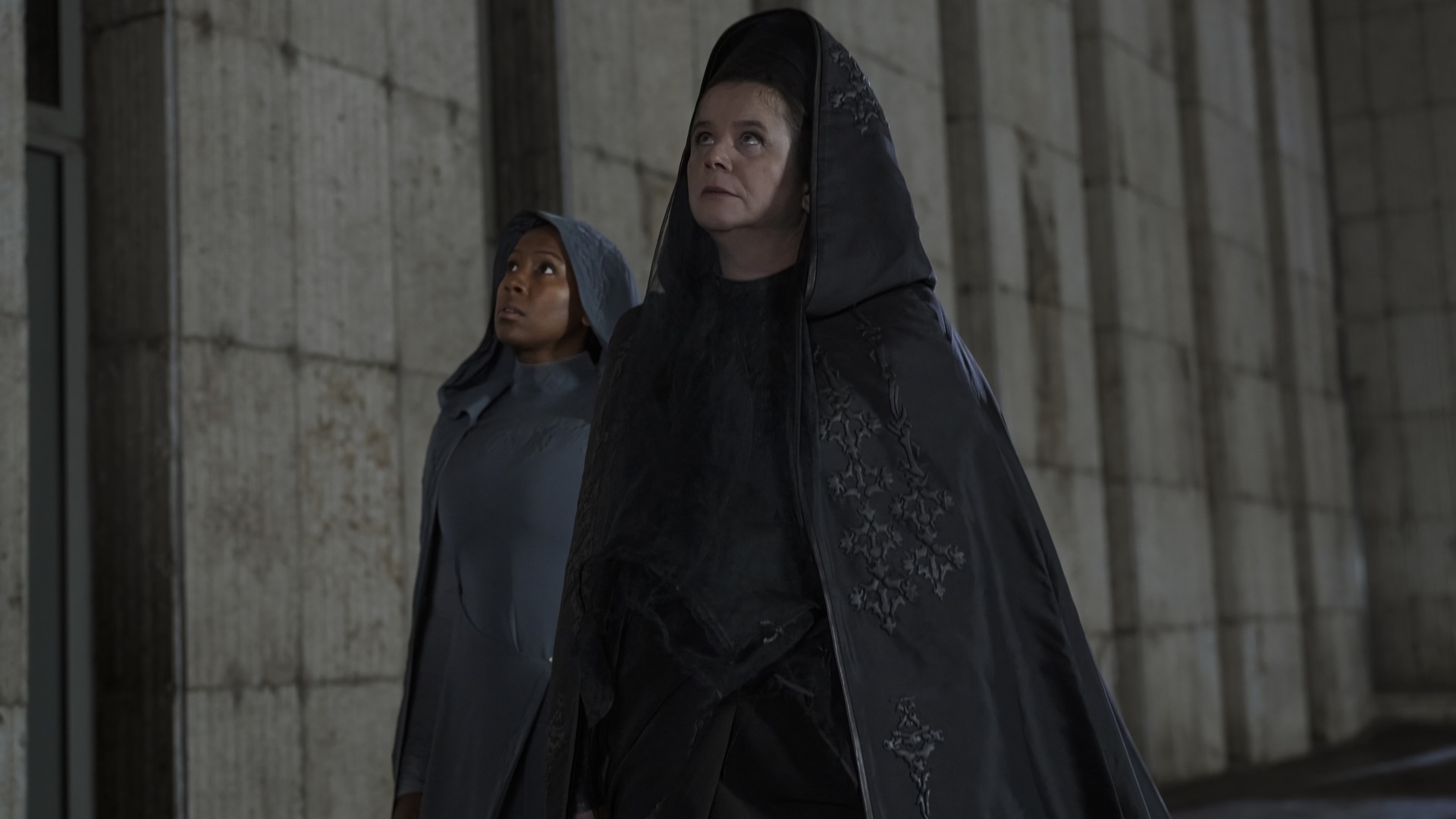
This review contains spoilers for Dune: Prophecy episode 4.
After three episodes of plotting in the shadows, Valya Harkonnen (Emily Watson) finally makes her first big move midway through “Twice Born,” the fourth episode of Dune: Prophecy. A montage shows Truthsayers in Valya’s hire whispering suggestions to a trio of heads of the great Houses. The Truthsayers suggest to the heads that Emperor Javicco Corrino (Mark Strong) assassinated Pruwet Richese (Charlie Hodson-Prior). When the heads all express their worry that investigating the claim will bring unwanted attention to their respective Houses, the Truthsayers encourage them to promote an ambitious minor House to their number and make that newcomer launch the investigation. The House in question? Harkonnen.
Without question, the scene looks great. Director Richard J. Lewis blocks the conversations well and the costume work by Bojana Nikitovic remains fantastic. It’s always striking to see the black clad members of the Sisterhood leaning toward the ornately costumed House heads.
At the same time, the plan is thuddingly obvious. Even suspending disbelief to allow for the compressed nature of a story like this, Valya Harkonnen’s hand in elevating her House to a prominent position and then making it the obvious fall guy for a move against the Emperor is anything but hidden.
This problem has been present from the beginning of Dune: Prophecy. As much as the show wants to be about schemers in secret, it’s in fact about people declaring plot points to one another and pretending that it’s all quite sneaky. To be clear, the problem here isn’t necessarily that this is a talky show instead of an action show. The Frank Herbert novels (and, to a much lesser extent, the prequel novels by Brian Herbert and Kevin J. Anderson) largely consist of ideological debates and philosophizing.
No, the problem with Dune: Prophecy is that the ideas characters discuss, much like Valya’s plan in “Twice Born,” written by Kevin Lau & Suzanne Wrubel, is thin and dumb. Dune and Game of Thrones, the latter being the true forerunner to Prophecy, already thoroughly explored the vagaries of power plays in much greater detail. Prophecy rarely has anything to say on the subject beyond “People do bad things to keep power!”
It’s not that Prophecy cannot do anything other than exposition. “Twice Born” begins with a powerful cold open that finds the Sisterhood acolytes all plagued by a nightmare in which they stand in near the well in their home and slice their own throats. The episode returns to the dream in a later sequence in which Tula (Olivia Williams) instructs the acolytes to enter a trance and draw what they see. Their drawings more or less recreate the show’s opening credits, but Lewis paces the scene well and Williams anchors the scene by playing Tula’s loss of control.
The acolytes end their drawing session with an image of two eyes peering out from a black space, which has reappeared throughout the series. “God is watching us,” declares Sister Emeline (Aoife Hinds). “The recokoning is here.”
Powerful as the moment is, “Twice Born” doesn’t let the audience or the actors sit in it. Worse, it feels the need to include a follow up scene in which Tula and Sister Avila (Barbara Marten) interpret the drawings. For all their discussion (and the actors’ screen presence), the conversation boils down to “There’s something scary out there we don’t understand.”
The conversation underscores the other major problem with Prophecy‘s plot-heavy approach. Instead of letting characters or themes drive the story, it relies upon the mystery of Desmond Hart (Travis Fimmel). Who is he? How does he have these powers?
Even that mystery seems beyond the show’s ability to do well, as it relegates all conversation about Hart to the obvious (why does he have these powers?) to the rich in dense in lore from secondary Dune novels (is he in service of Omnius or Erasmus or the Titans?). By the time the episode ends with the reveals that Lila (Chloe Lea) has been resurrected by the Sisterhood’s illegal Thinking Machine Anirul and that a Bene Tleilax face dancer is in House Harkonnen, neither Herbert fans nor casual viewers are shocked or engaged.
For that reason, Travis Fimmel proves to be the best part of Dune: Prophecy. “Twice Born” climaxes at a meeting of the Landsraad, in which Harrow Harkonnen (Edward Davis) enacts Valya’s plan by bringing charges against House Corrino for the murder of Pruwet Richese. At the same time, Keiran Atreides (Chris Mason) plants his bombs to destroy the Great Houses. Before either Harrow or Keiran can act, Princess Ynez (Sarah-Sofie Boussnina) arrives to make the case against her father.
Hart interrupts the proceedings and claims to deliver order. He admits that he killed Pruwet for using a thinking machine and proceeds to produce members of the resistance, including Horace (Sam Spruell) and the Ixian, but not Keiran nor the Fremen Mikaela (Shalom Brune-Franklin). With Javicco’s permission, Hart uses his internal burning powers to execute the resistance leaders and the Heads of the houses plotting against the Emperor.
It all comes with a monologue delivered with ridiculous theatricality by Fimmel. His lilting voice, his pregnant pauses, his ostentatious poses all feel overly contrived. At no point does Fimmel feel like a real person existing in the world. He’s constantly showing audiences how hard he’s acting. And that’s exactly what makes him so compelling. When great actors like Williams and Emily Watson must play dumb people pretending to be plotters, Filmmel’s inability to pretend to be a scheming soldier makes him feel truly chaotic.
Hart’s preening monologue and the spectacular execution that follows proves what I’ve feared about Dune: Prophecy from the beginning. It’s the exact opposite of what it tries to be. It’s a dumb show about people pretending to be smart. It’s an obvious show about people who say they’re playing three dimensional chess. As “Twice Born” demonstrates, that contradiction can have its pleasures, especially with such strong visuals. But the episode, and the series on the whole, feels undercooked.
Dune: Prophecy airs Sundays at 9 p.m. ET on HBO and Max.
Learn more about Den of Geek’s review process and why you can trust our recommendations here.
The post Dune: Prophecy Episode 4 Review – A Landsraad Conspiracy appeared first on Den of Geek.



